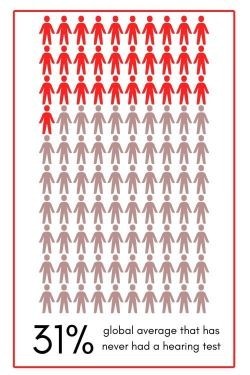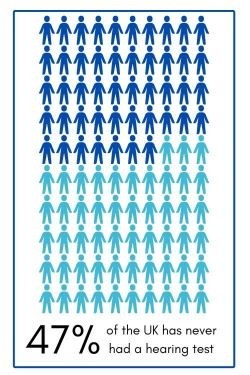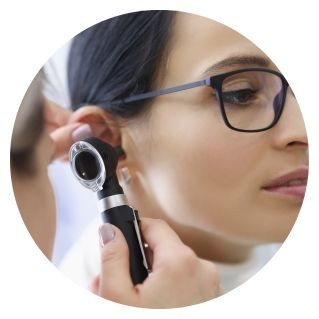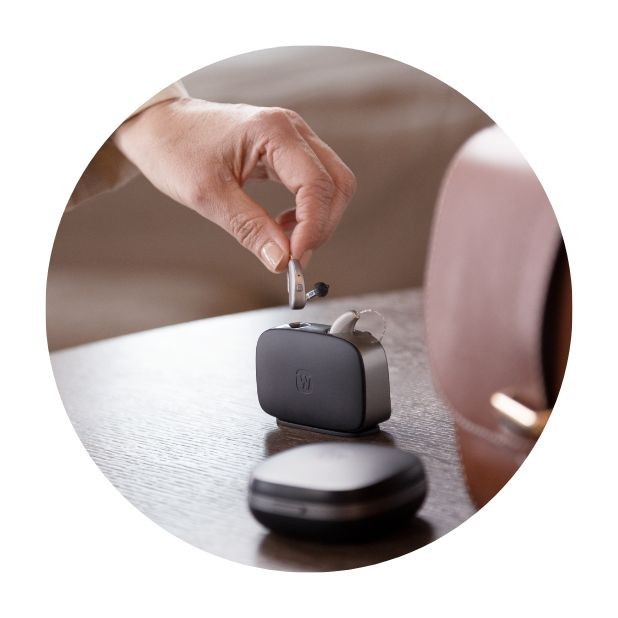Free home visits
with a local audiologist
Last Hearing Aid UK Update: 17
Here at Hearing Aid UK, our audiologists offer private hearing tests at clinics across the UK, giving you quick access, no waiting lists, and clear, personalised advice.
Tests include the latest diagnostics, and hearing aids can often be fitted on the same day if needed. Whether you want a second opinion or to take control of your hearing health, we make it simple, local, and convenient.
On this page, we talk about what to expect from your hearing test, hearing aid fittings, and programming in the clinic.

Our convenient and accessible services provide quick and accurate assessments of your hearing health.
Many people start with a simple online search for a hearing test near them, and we're here to provide trusted, professional results locally.
Located in your area, our certified professionals offer comprehensive hearing tests that cater to adults of all ages.
We use state-of-the-art equipment to ensure diagnosis precision and reliability.
Early detection and diagnosis are key to successful treatment, and our testing thoroughly identifies problems promptly.

Especially when an early diagnosis is important for receiving the best treatment and determining the success of your hearing healthcare.
Maybe it is due to not understanding the dangers of long-term, untreated hearing loss.
Or they may feel there is a stigma surrounding hearing loss and see it only through a negative lens.
Either way, putting off seeking professional help and living without amplification, your perception of sound can change.

However, what they don’t understand is how discrete and modern the hearing solutions are today.
Early diagnosis is key to ensuring hearing aids are correctly programmed to your own unique hearing loss, if hearing aids are what’s needed.
If this sounds familiar, looking into a hearing test near you is the first positive step towards regaining control of your hearing.


The right audiologist will go through the whole audiogram process. It is completely natural to feel anxious about attending your first hearing assessment, as you don’t know the true process of a hearing test and audiogram. You might also be unsure how to understand audiogram results and hearing loss levels.
A good audiologist will make everything clear and ensure you understand the steps needed for a hearing test. This way, you will have a better understanding and will, in turn, feel more confident. Here we answer those questions for you, in the hope that it will help you to make the right decision in getting help.
Considering a second opinion on your hearing care? Whether you're looking for a second opinion on hearing aids, a hearing test, or simply advice on hearing healthcare or pricing you've received elsewhere, we're here to help.
If you're unsure about a previous hearing assessment or advice from another provider, let us help put your mind at ease.
You can always look for another hearing test near me to confirm any diagnosis and explore your options with confidence. Explore new options for hearing care, compare prices, and book a second opinion with us. The benefits of a second opinion include peace of mind, a reinforced diagnosis, and a better understanding.
To put it simply, an audiogram is a hearing test graph that shows the results of your test with an audiologist. It displays one part of your complete assessment and is the most useful tool to piece together your hearing capabilities and challenges.
When you are being tested, sounds are sent to you at various pitches and volumes using a computer-driven audiometer. This allows an audiologist to adjust the pitch of those sounds manually and at what intensity.
You will respond to these sounds by pressing a button to indicate when you hear them. The quietest level of each sound you hear is recorded at each pitch, then plotted on the audiogram. An audiologist will use a red circle for your right ear and a blue one for your left.
These recordings, using the circles, are comparisons to normal hearing levels of 25dB overall pitches of sound. The further down the results are on the graph, the louder the sound has to be adjusted.
Your audiologist will explain what the results show concerning your volume, pitch, and speech sounds. They will be reading an audiogram to gain a clearer insight as to the level of any hearing loss and potentially the most probable cause.
If any other medical issue is apparent, then your audiologist will refer you to an ENT specialist. This is all part of what you can expect when you arrange a hearing test near me with our experienced team.

A good audiologist will take their time and allow for around an hour to fully assess your hearing ability; however, the actual hearing test will take about 20-30 minutes to complete. After that, your audiologist will go through your diagnosis thoroughly using your audiogram results and list the options available to you.
They will help you decide, if needed, the best hearing solution for you and your hearing loss needs, along with making plans for your hearing aid fitting, follow-up appointment, and treatment going forward. Depending on availability and the hearing aid model, they might be able to fit and program your hearing aid then and there.
Hearing tests, also known as audiometric evaluations or audiograms, are an important part of hearing healthcare in clinics.
These tests are used to determine the nature and level of a person's hearing loss, if any, and to guide the selection and fitting of hearing aids or other assistive devices that would support their hearing healthcare going forward.
The results will also be used to monitor the progression of hearing loss over time and to evaluate the effectiveness of any treatment that is provided.
It all depends on how exposed you are to harmful sounds. For example, if you work on a building site, you would need to have an annual hearing test. However, you should get your hearing checked immediately if you think your hearing might have changed, even if you already wear hearing aids.
Other than that, on average, we would recommend testing your hearing at least every three years - unless your audiologist has stated otherwise. Consistent hearing healthcare is key to preventing further deterioration and improving your quality of life.

Both the air and bone conduction results of the pattern and position for both ears are read by the audiologist. They determine the level, nature, and cause of the results shown and highlight problematic ranges. Some people may refer to an audiogram as a 'hearing test chart' or 'hearing test graph'.
The audiogram’s vertical axis shows the volume or intensity of the sound given – measured in decibels (dBHL). It begins at 10 dBHL and finishes at 120 dBHL. The horizontal axis displays where the low-pitch sound starts and escalates in pitch as you go through your test.
When the audiologist reads the results for both ears and finds a level of hearing loss, it is generally found in both ears.
However, sometimes there can be asymmetry and varying levels. Your air and bone conduction tests are compared, and you will be shown if this is the case and if your loss is sensory-neural, conductive, or both.
What are decibels, and what are frequencies? Decibels are what we measure sound in and are not permanent values like volts and meters. This scale is logarithmic and doubles the sound pressure level, increasing by 6 dB.
The dB scales vary according to the environment the sound travels through, using a calibrated decibel hearing level scale.
Frequency is the number of vibrations per second in each sound wave and is measured in Hertz (Hz). The higher the level, the higher the frequency.
The vibrations used are between 20 and 20,000 Hz and reflect the sounds heard by us every day. Nature sounds, such as bird songs, would be a high tone, and a bass guitar would be a low one.
If you have a high-frequency loss, it generally means that you have problems hearing high-frequency sounds only. Consonants like s, f, and sh are hard to make sense of. Whereas low-frequency loss, being less common, affects the ability to hear vowels in conversation.

As a routine, hearing tests for newborn babies are carried out in the hospital to quickly identify any problems at the start of their development. This is called a newborn hearing screening.
Following this, children's parents are generally asked from 9 months to 2 and a half years of age if they have any concerns regarding their child's hearing. Then, a hearing test is done around the time children start school, either in school or at the hospital.
Hearing problems in childhood are not common, but hearing tests for kids of all ages can be done through the NHS or private healthcare. It is important to always check children's hearing, if there are any concerns, as early testing makes sure that any issues are diagnosed and managed as early as possible.
Wherever you go for your hearing test, it should be free, but some hearing aid providers do charge, especially if you want to test your hearing at home. We recommend you ask your audiologist before you book your appointment to avoid any disappointment.
At Hearing Aid UK, all our hearing tests, aftercare, digital hearing aid fitting, and programming are included in the price of the hearing aid(s).
On another note, the NHS provides free hearing tests and usually, your GP will refer you to the NHS to book an initial appointment with an audiologist. Because it normally takes up to six weeks to get an appointment, patients often get tested privately instead.

Choosing between hearing care in a clinic or at home will depend on your specific needs and preferences. Both options have their own advantages and disadvantages.
It may be helpful to talk to an audiologist or hearing healthcare professional to determine the best option for you.
A hearing aid fitting in a clinic is done to ensure that a hearing aid is properly adjusted and customised to meet the specific needs of your own unique hearing loss. We go through the typical process below:

A consultation is done with an audiologist or hearing aid specialist to discuss the results of your hearing test, as well as your needs and preferences.
They will also discuss the different types of hearing aids available and which one will be the best fit for you.
You will select a hearing aid that suits your needs, loss, and budget with support from your audiologist.
The hearing aid will be adjusted and programmed to your specific hearing loss perfectly.
This may involve adjusting the volume and frequency response, as well as fine-tuning the settings to match your unique hearing profile.

You will have follow-up appointments to check that the hearing aid is working properly and that you remain satisfied with the fit and performance.
The audiologist will give advice on how to take care of your hearing aid and use it properly.
In conclusion, fitting a hearing aid in a clinic is a process that is done to ensure that a hearing aid is properly adjusted and customised to meet your specific needs and hearing loss.
The fitting process may take several appointments to ensure that the hearing aid is properly adjusted and customised to your satisfaction and comfort.
We offer private hearing tests at local UK clinics with no waiting lists, unlike NHS services that can take 6+ weeks.
Skip the waiting lists and get a professional hearing assessment at your local clinic.
Our qualified audiologists provide comprehensive testing with same-day results and often hearing aid fitting.
Call us free on 0800 567 7621
Do not spend hundreds of pounds without getting a second opinion from us.
 Not only are the prices great, but the service is fantastic! Many thanks to your team.
Not only are the prices great, but the service is fantastic! Many thanks to your team.Well, while you are being tested sounds are sent to you at various pitches and volumes using a computer-driven audiometer. You will respond to these sounds by pressing a button to indicate when you hear them. An audiologist will use a red circle for your right ear and a blue one for your left. These markings will give your audiologist a bigger picture of how well you hear.
Well, while you are being tested sounds are sent to you at various pitches and volumes using a computer-driven audiometer. You will respond to these sounds by pressing a button to indicate when you hear them. An audiologist will use a red circle for your right ear and a blue one for your left. These markings will give your audiologist a bigger picture of how well you hear.
A good audiologist will take their time, however, a hearing test will generally take about 20-30 minutes to complete.
When we refer to a product as 'Latest Launch', we mean it is the latest to be released on the market.
When we refer to a product as 'New', we mean that the product is the newest hearing aid model on the market.
When we refer to a product as 'Superseded', we mean that there is a newer range available which replaces and improves on this product.
When we refer to a product as an 'Older Model', we mean that it is has been superseded by at least two more recent hearing aid ranges.